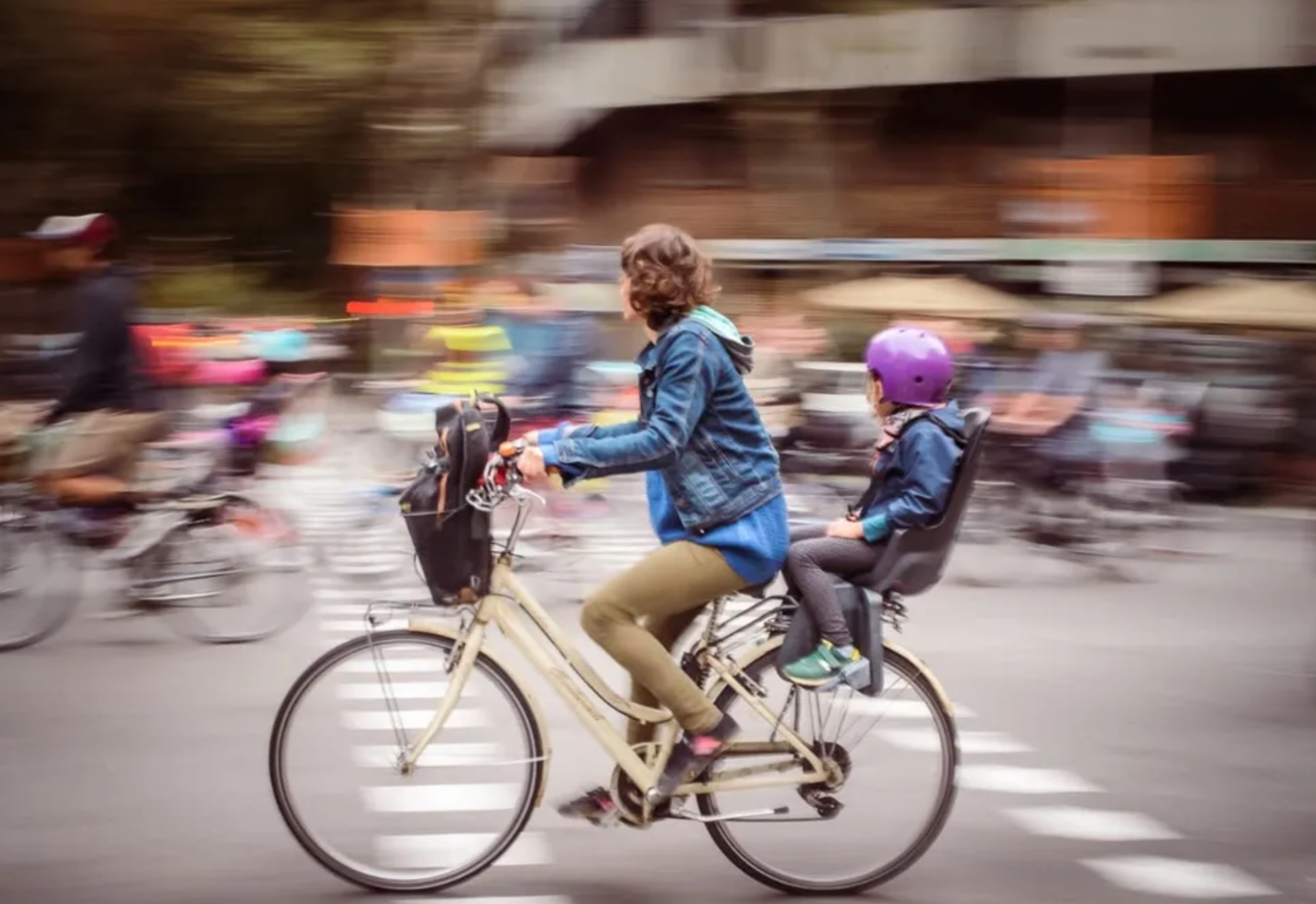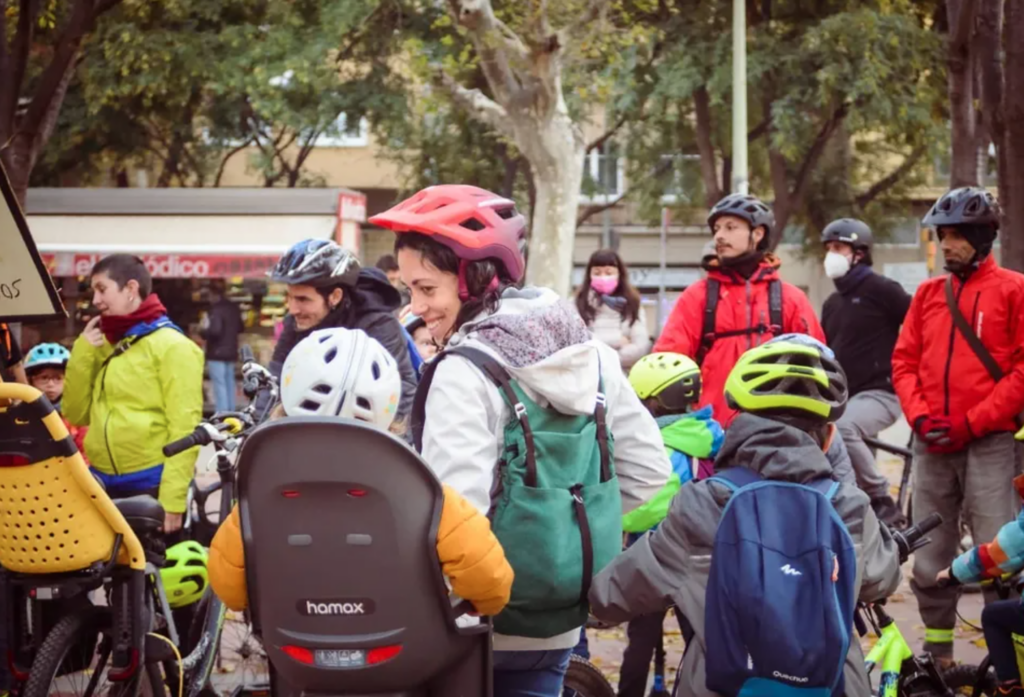Giving caregivers the confidence to cycle
Behaviour-focused initiatives help overcome barriers so more families can cycle together
Behaviour-focused initiatives help overcome barriers so more families can cycle together
 Photo: Courtesy of Calvox & Periche.
Photo: Courtesy of Calvox & Periche.
Cycling has many potential benefits for infants, toddlers and caregivers. It can be a low-cost, flexible and efficient way of making routine trips to local facilities such as daycare, shops and clinics (Sánchez de Madarlaga, 2018). It provides opportunities for caregiver–child communication that can develop children’s social-emotional skills (BYCS & Bernard van Leer Foundation, 2020). It can lead to more interactions with others in the community, and a deeper connection with the built and natural environment. Cycling has been shown to improve children’s and caregivers’ physical and mental health (Bigard, 2021).
Yet in many contexts, it is disproportionately difficult for caregivers to cycle. Why? In 2022–2023, BYCS, an Amsterdam-based, international NGO supporting community-led urban change through cycling, is undertaking a global survey and engaging with focus groups to better understand the nuanced and culturally specific challenges that discourage caregivers from taking up cycling. This work includes understanding the behaviour-based barriers and how they can be addressed through behavioural science.
Some common barriers and explicit concerns are already known, and these may also vary depending on the age of the child a caregiver is travelling with. In some contexts, riding a bicycle is incompatible with caregivers’ identities or social aspirations: it may be seen as a recreational activity for the rich or, conversely, as something done only by the poor who cannot afford alternative modes of transport.
Another set of barriers relate to caregivers’ self- efficacy, as they often fear that carrying a child and other items, such as groceries, on a bicycle will be too physically difficult or uncomfortable, especially when dealing with hills, poor roads or extreme weather.
The most-mentioned challenge is the perception that cycling is unsafe, due to a lack of infrastructure and – in some cases, for women – cultural norms (Ramboll, 2021). This means that those most likely to be the primary caregivers for young children face the greatest barriers to accessing the benefits of cycling.
People are often correct in their perceptions of biking as unsafe or uncomfortable, especially in cities that have not invested in the correct cycling infrastructure. Some of these challenges can be tackled by creating protected, wide and connected infrastructure that makes it much safer for parents to use a bike – especially alongside providing more inclusive bike-share systems that include baby seats and baskets to carry goods, as is happening in Fortaleza, Brazil and Bogotá, Colombia.
But even if a city provides such infrastructure and services, perceptions of risk or of discomfort can be exaggerated beyond what is empirically correct. This is where a behavioural approach can make a difference. Deeper understanding of the experiences and perceptions that caregivers have about cycling can bring to light ways to make uptake of cycling seem possible and beneficial for their daily lives.
“Deeper understanding of the experiences and perceptions that caregivers have about cycling can bring to light ways to make uptake of cycling seem possible.”
Only a small number of studies have so far attempted to understand how to address these barriers, and change mobility behaviours. One approach is to build skills. Some of the fears caregivers have about cycling are related to their lack of knowledge and experience. Providing an opportunity for caregivers to try different kinds of bicycles and develop their skills in safe environments can overcome this barrier by building confidence in their own competencies.
In the Miguel Hidalgo neighbourhood of Mexico City, for example, the NGO Bicitekas has held workshops entitled “Mamás Pedaleando Sin Miedo” (Mothers pedalling without fear), where its members, accompanied by instructors from the local cycle school, supported a group of mothers to acquire the right skills to ride with their children around the city. They shared their knowledge, provided the opportunity to try different cycles and equipment suited for care trips, assessed their skills both off- and on-road, and gave useful tips for safely navigating traffic with children.
When groups of caregivers develop skills together, they can mutually reinforce each other’s growing confidence. As workshop leader Mariana put it: “It is gratifying that something we have learned to do out of necessity (the need to transport ourselves) and pleasure (the pleasure of riding a bike) can now make more moms feel confident to ride a bike with their babies. It was a workshop that sought to generate confidence and empathy, as a tribe of women who support and guide each other” (Sánchez Chamakleta, 2021). Bicitekas continues to develop programmes that support women caregivers to cycle.
“When groups of caregivers develop skills together, they can mutually reinforce each other’s growing confidence.”
The Bicibús initiative gained media attention, spurring other communities around the world to form their own versions of the “bicycle bus” (Blanchar & Battista, 2021). As one news report said of a parent: “with the Bicibús, she feels a sense of relief when her son bikes to school on Fridays because she knows he’ll be safe” (Shivaram, 2021).
The success of these programmes points to further potential for approaches informed by behavioural insights to scale-up change in caregivers’ mobility choices. Very little research to date has provided a detailed account of people’s experiences completing care trips with young children by bicycle (Ravensbergen et al., 2020). More empirical research is needed from different contexts, in order to understand their specific needs.
BYCS will use the results of its research to compile a toolkit of good practices that can help local governments and advocacy groups to understand what specific interventions might work most effectively to address the most important barriers in their contexts, and build a coalition of stakeholders to unlock the benefits of cycling for families with young children and help to create more healthy, caring and sustainable urban environments.

Photo: Courtesy of Calvox & Periche.
See how we use your personal data by reading our privacy statement.
This information is for research purposes and will not be added to our mailing list or used to send you unsolicited mail unless you opt-in.
See how we use your personal data by reading our privacy statement.